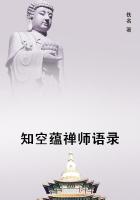Yes, it was one of the things she should go down to her grave without having known--how Charlotte, after all had been said, REALLY thought her stepdaughter looked under any supposedly ingenious personal experiment. She had always been lovely about the stepdaughter's material braveries--had done for her the very best with them; but there had ever fitfully danced at the back of Maggie's head the suspicion (14) that these expressions were mercies, not judgements, embodying no absolute but only a relative frankness. Had n't Charlotte, with so perfect a critical vision, if the truth were known, given her up as hopeless--hopeless by a serious standard, and thereby invented for her a different and inferior one, in which, as the only thing to be done, she patiently and soothingly abetted her? Had n't she in other words assented in secret despair, perhaps even in secret irritation, to her being ridiculous?--so that the best now possible was to wonder once in a great while whether one might n't give her the surprise of something a little less out of the true note than usual. Something of this kind was the question that Maggie, while the absentees still delayed, asked of the appearance she was endeavouring to present; but with the result repeatedly again that it only went and lost itself in the thick air that had begun more and more to hang, for our young woman, over her accumulations of the unanswered.
They were THERE, these accumulations; they were like a roomful of confused objects, never as yet "sorted," which for some time now she had been passing and re-passing, along the corridor of her life. She passed it when she could without opening the door; then, on occasion, she turned the key to throw in a fresh contribution. So it was that she had been getting things out of the way. They rejoined the rest of the confusion; it was as if they found their place, by some instinct of affinity, in the heap. They knew in short where to go, and when she at present by a mental act once more pushed the door open she had practically a sense of method and experience.
What she (15) should never know about Charlotte's thought--she tossed THAT in. It would find itself in company, and she might at last have been standing there long enough to see it fall into its corner. The sight moreover would doubtless have made her stare, had her attention been more free--the sight of the mass of vain things, congruous, incongruous, that awaited every addition. It made her in fact, with a vague gasp, turn away, and what had further determined this was the final sharp extinction of the inward scene by the outward. The quite different door had opened and her husband was there.
It had been as strange as she could consent afterwards to think it; it had been essentially what had made the abrupt bend in her life: he had come back, had followed her from the other house, VISIBLY uncertain--this was written in the face he for the first minute showed her. It had been written only for those seconds, and it had appeared to go, quickly, after they began to talk; but while it lasted it had been written large, and though she did n't quite know what she had expected of him she felt she had n't expected the least shade of embarrassment. What had made the embarrassment--she called it embarrassment so as to be able to assure herself she put it at the very worst--what had made the particular look was his thus distinguishably wishing to see how he should find her. Why FIRST?--that had later on kept coming to her; the question dangled there as if it were the key to everything.
With the sense of it, on the spot, she had felt overwhelmingly that she was significant, that so she must instantly strike him, and that this had a kind (16) of violence beyond what she had intended. It was in fact even at the moment not absent from her view that he might easily have made an abject fool of her--at least for the time. She had indeed for just ten seconds been afraid of some such turn: the uncertainty in his face had become so, the next thing, an uncertainty in the very air. Three words of impatience the least bit loud, some outbreak of "What in the world are you 'up to,' and what do you mean?" any note of that sort would instantly have brought her low--and this all the more that heaven knew she had n't in any manner designed to be high. It was such a trifle, her small breach with custom, or at any rate with his natural presumption, that all magnitude of wonder had already had, before one could deprecate the shadow of it, the effect of a complication. It had made for him some difference that she could n't measure, this meeting him at home and alone instead of elsewhere and with others, and back and back it kept coming to her that the blankness he showed her before he was able to SEE might, should she choose to insist on it, have a meaning--have, as who should say, an historic value--beyond the importance of momentary expressions in general. She had naturally had on the spot no ready notion of what he might want to see; it was enough for a ready notion, not to speak of a beating heart, that he DID see, that he saw his wife in her own drawing-room at the hour when she would most properly be there.














